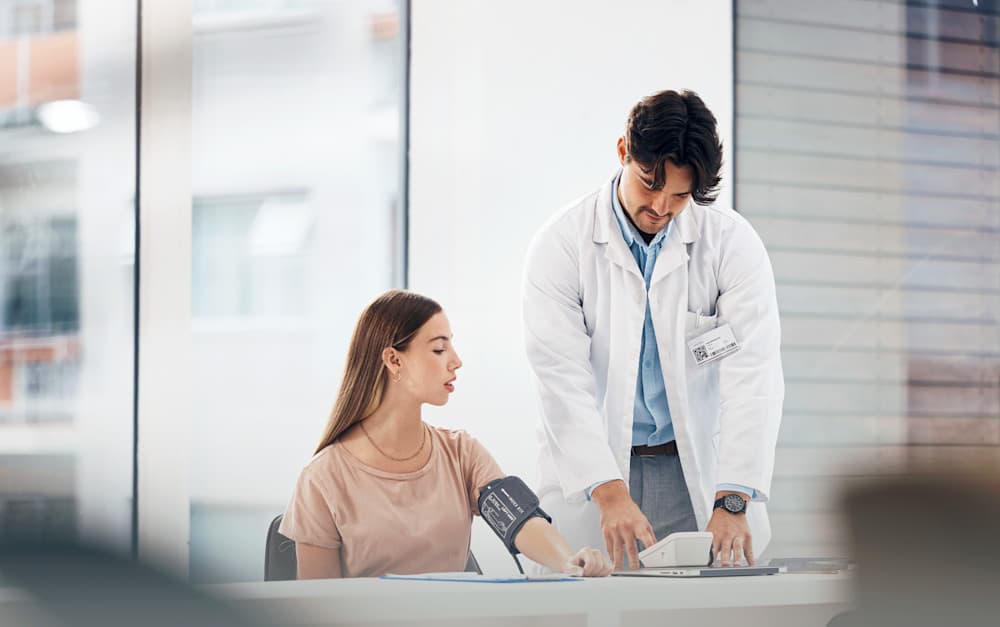Do You Have to Wear a Mask After the COVID-19 Vaccine?

6 Minutes

Team Curative

Apr 10, 2021
The COVID-19 vaccination rollout in the United States brings us one step closer to the end of the pandemic. Even though some states have lifted mask-wearing mandates—including Texas, Florida, Arizona, Arkansas, and Wyoming as of April 10, 2021—many federal health authorities are strongly advising everyone to continue with proper use of face coverings, regardless of whether or not you’ve been vaccinated. These recommendations have led to many people wondering, “Do you have to wear a mask after the COVID-19 vaccine?”
Other questions may include:
How long do we have to wear masks?
If a person receives the COVID-19 vaccine, aren’t they protected against the virus?
Shouldn’t vaccination mean going back to a life without worrying about the pandemic?
In this article we will discuss what health experts and the U.S. Centers for Disease Control and Prevention (CDC) say about COVID-19 vaccine protection and how long we have to wear masks.
On March 29, 2021, the CDC published a report showing that FDA-authorized coronavirus vaccines not only protect against severe COVID-19 cases, but are also highly effective against milder coronavirus infections in real-world conditions. The research indicates that these two vaccines can reduce the transmission of the virus that causes the COVID-19 disease.
There have been, however, a number of reports of people experiencing a rare blood clot disorder after receiving the vaccine.
For more on the science of vaccines and vaccine effectiveness, click here.
What Does It Mean to Be Fully Vaccinated?
During March 2021, the CDC began to relax some guidelines for fully vaccinated people, including the use of face masks. To avoid any confusion, we’ll review what the CDC considers as being fully vaccinated.
The CDC considers you fully vaccinated if you meet one of the following criteria:
It’s been two weeks since you got your second shot of a two-dose COVID-19 vaccine, such as the Pfizer vaccine or the Moderna vaccine.
It’s been two weeks since you got a single-dose vaccine.
If you don’t meet one of those requirements, you are NOT considered fully vaccinated and should continue to follow the precautions outlined by the CDC to keep yourself and those around you safe until you are fully vaccinated. Learn more about CDC guidelines for fully vaccinated people.
Do You Have to Wear a Mask After the COVID-19 Vaccine?
Further research is needed to determine if fully vaccinated people are still able to spread the virus, even if they don’t show any symptoms. It may be possible for the novel coronavirus to occupy the respiratory tract of a fully-vaccinated person even as the immune system works to protect the body from COVID-19.
Avery August, a professor of immunology at Cornell University said, “We know now the vaccines can protect, but what we haven’t had enough time to really understand is—does it protect from spreading?” It is for this reason that public health officials still recommend mask-wearing and social distancing among those who are fully-vaccinated so we can continue to protect those around us who may not be vaccinated and/or are immunocompromised.
Dr. Anne Rimoin, a professor of epidemiology at UCLA Fielding School of Public Health explained, “It will take time to widely distribute the vaccine and achieve herd immunity, so non-pharmaceutical interventions like mask wearing and social distancing will continue to be crucial to stopping the spread.”
Dr. Bruce Y. Lee, a professor at the City University of New York’s School of Public Health said, “Hopefully we can get a majority of the population vaccinated… that’s when we can start talking about moving toward normal.”
Additionally, scientists and health experts are still learning about how long the coronavirus vaccines protect against the virus and how the emergent variants of the virus could potentially impact the effectiveness of the vaccines. Time and ongoing research will answer these uncertainties.
Some health experts, including Dr. Michal Tal, an immunologist at Stanford University, believe that masks could be part of health worker lives even past the pandemic. “I suspect that, moving forward, doctors and nurses may incorporate masks as a standard part of personal protective equipment for their interactions with patients, much as glove wearing became standard during the AIDS epidemic and then became standard protective gear,” Dr. Tal stated. “I think that the vast majority of us, however, can look forward to mask-free days as soon as everyone has had a chance to get vaccinated and viral spread in the community is low.”
Nevertheless, those who are fully vaccinated can be mask-free in some settings. Dr. Anthony Fauci, the director of the U.S. National Institute of Allergy and Infectious Diseases, said that small reunions with people who are fully vaccinated are quite safe. “Small gatherings in the home of people, I think you can clearly feel that the relative risk is so low that you would not have to wear a mask, that you could have a good social gathering within the home,” Dr. Fauci assured.
What Do Health Experts Recommend You Can Start Doing if You’re Fully Vaccinated?
According to CDC guidelines updated April 2, 2021, people who are fully vaccinated can start doing some things they were forced to stop because of the pandemic.
Some of those things include:
Indoor small gatherings with other fully-vaccinated people without wearing face coverings nor practicing social distancing.
Indoor small gatherings with unvaccinated people of any age from another household without wearing face coverings nor practicing social distancing, unless gathering with someone who has an increased risk of getting severely ill from COVID-19.
Traveling in the U.S. without getting tested before and after travel or self-quarantining after travel. Face masks are still mandatory on public transportation including planes, buses, and trains.
Traveling outside the U.S.––check your destination’s guidelines regarding testing prior to travel, additionally:
No need to test before flying outside the U.S. unless your destination requires it.
A negative test result is needed before flying back to the U.S., from no more than three days before the departure date.
You should get tested 3 to 5 days after international travel.
No need to self-quarantine after arriving in the U.S.
If you’ve been with someone who tested positive for COVID-19, there’s no need to get tested or distance from others unless you have coronavirus-related symptoms or live in a group setting, such as a correctional, detention facility, or a group home. In that case, you’re required to get tested and self-quarantine for 14 days.
What Do Health Experts Recommend You Should Keep Doing Even if You’re Fully Vaccinated?
Based on the latest update of the CDC’s guidelines, people who are fully vaccinated should continue to:
Avoid medium and large-sized gatherings.
Adhere to your workplace’s guidelines.
Watch out for any COVID-19 related symptoms.
Whenever you are in public places or public transportation, are with unvaccinated people from more than one other household, or are with an unvaccinated person with an increased risk of severe illness or death from COVID-19 (or someone who lives with such a person), you should:
Properly wear a face mask over the mouth and nose.
Practice social distancing at least 6 feet apart from others.
Avoid crowded and poorly ventilated spaces.
Get a COVID-19 Vaccine Today
We all need to work together to keep our communities safe while we navigate this pandemic. At this time, it’s crucial to continue implementing the well-known safety strategies that bring us much closer to life beyond the pandemic. Broad COVID-19 testing and vaccination will help protect yourself and those around you. If you’re eligible in your state, locate a COVID-19 vaccine near you.
Curative Inc. and its subsidiary, Curative Management Services LLC, engage with medical entities that provide vaccination services.
Sign up for our Newsletter
Table of Contents
What Does It Mean to Be Fully Vaccinated?
Do You Have to Wear a Mask After the COVID-19 Vaccine?
What Do Health Experts Recommend You Can Start Doing if You’re Fully Vaccinated?
What Do Health Experts Recommend You Should Keep Doing Even if You’re Fully Vaccinated?
Get a COVID-19 Vaccine Today








